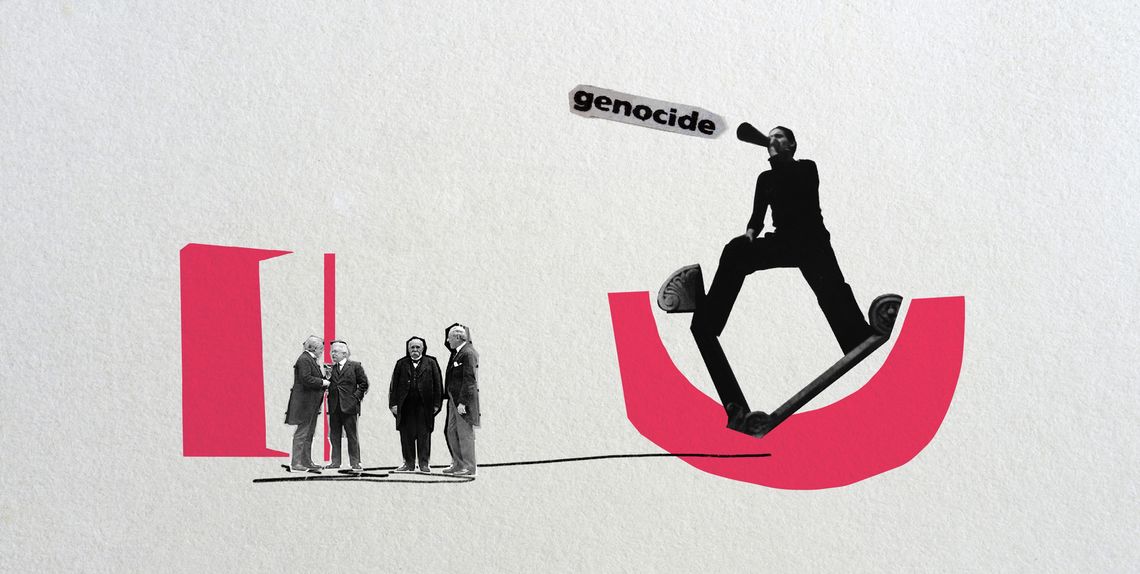The recognition of the Armenian Genocide by the United States, through President Joe Biden’s statement on April 24, 2021, corresponds to its own national interests. In its wake, other powers allied with the U.S. are considering following suit. Will Armenia be able to take advantage of this shift in global geopolitics from the Transatlantic to the Indo-Pacific?
Turkey is tired of the Armenian Question. While it may spend billions of dollars to cover up or distract from the truth, and flex its military capabilities against Artsakh in 2020, it is not succeeding. The Armenian stone in its shoe is hobbling its gait more and more, to the point that it is becoming harder to walk. Everything indicates that Turkey’s handicap is worsening, that its pathology is amplifying. Why? Because the theme of genocide is gaining momentum in Western diplomacy for two reasons: the Chinese challenge to the West and the return of democratic ethics in Washington.
For several years now, the diplomacy of the Western powers has placed China on their radar as its largest geopolitical challenger. A priori, the United States formulates its agenda according to the presence of this Chinese threat. Where Beijing does not appear, which is increasingly rare, the United States shows no interest. But where Beijing attempts to make inroads, the Americans redouble their efforts to invest in order to thwart Xi Jinping's ambitions.
In addition to the tension with China, the United States has changed another part of its strategic paradigm: to reaffirm the concept of democracy and human rights. As such, Washington's foreign policy relies on American domestic demand. The middle class, under pressure from the left of the Democratic Party, and in particular from the Bernie Sanders wing, have imposed a return to an international ethic to restore America's place in the world.
This return to the fundamentals of American exceptionalism—the promotion of democracy—aims above all to distinguish the democratic space from the rest of the world, especially authoritarian powers such as China, Russia and Turkey, whose connivance is increasingly evident and directed against the West, with the United States in the lead. Not only is Washington banking on the return of the attractiveness of the democratic model against the illiberal model of emerging powers, especially China, but America is also seeking to restore the image of democracy in the world by denouncing violations of human rights in Yemen under the blows of Saudi Arabia, in Muslim Xinjiang under Chinese persecution, in Ukraine under Russian threat and by recognizing the Armenian Genocide. Thus, in the wake of the White House, the United Kingdom, Australia and Israel have also tabled genocide recognition on their parliamentary agendas.
This return of Cold War rhetoric embraces a rapidly-changing tectonic shift of the geopolitical plates. The shift in the center of gravity of the world order from the Transatlantic to the Indo-Pacific redistributes alliances and invites democracies to strengthen their diplomacy against China and its partners, notably Russia and Turkey. This is where the South Caucasian challenge comes in, in particular the Armenian issue. Who will dominate the opening up of the South Caucasus through the reopening of communication routes? How is it going to unfold? Russia, Turkey and Iran are proposing the anti-Western “3 + 3” format (the three old empires + Azerbaijan, Armenia and Georgia). Azerbaijan is in favor of this format; the change of pivot from the Atlantic to the Indo-Pacific consolidates its convergence with Ankara. Georgia is against this “3 + 3” format, which excludes the West from the transformation of the South Caucasus. Neither does Tbilisi see the Sino-Russian-Turkish rapprochement as having the slightest effect on its Euro-Atlantic partnership.
On the other hand, the stakes for Armenia are quite different: Yerevan does not dare to display its hostility toward the “3 + 3” format so as not to upset Moscow, but the Indo-Pacific pivot considerably changes its strategic value. Why? Because China has muted its fight against Pan-Turkism since Ankara turned a blind eye to the repression against the Uighurs in Xinjiang. In return, Beijing welcomes the strengthening of the East-West corridor in the Caucasus but has not yet crossed the Rubicon (here, the Arax River) by accepting the prospect of a corridor between Azerbaijan and Nakhichevan. Beijing has a different conception of time. The Russo-Turkish rapprochement is itself ambivalent and forces Armenia to obtain the favors of other powers, such as the West or India. It is not by chance that, among the countries of the South Caucasus region, Washington invited only Armenia and Georgia to participate in the “Summit for Democracy” on December 9-10, 2021. It is also not by chance that Ankara is not invited to this forum for the defense of democracy. It is also no coincidence that New Delhi is seeking to seal a strategic partnership with Yerevan. Finally, it is no coincidence that France and Greece have sealed, with Washington's backing, a strategic agreement indirectly targeting Turkey.
Turkey has expended its strategic value in the eyes of Americans and Europeans, especially among younger generations less affected by the Cold War of the 20th century. In the days of the bipolar world, the enemy of the West was the Soviet Union. The United States favored its alliance with Turkey—NATO's stronghold in southern Europe—and blocked the Armenian Question in Congress. Today, in this world increasingly articulated around the relationship between the United States and China, the main challenger to the Americans is China. Turkey is close to Beijing, and the Americans no longer have any reason to favor Ankara, which is far from the Indo-Pacific space. Whereas, before the 2000s, Turkey was at the center of the American strategic game against the USSR; since 2010-2020, Turkey is now on the periphery of the American strategic game against China. Under these circumstances, Beijing has no reason to recognize the Armenian Genocide; not only would it interfere with its relations with Ankara, but it would leave it vulnerable to the Uighur problem, an internationalization that it cannot envisage.
How will Armenia position itself as Cold War rhetoric makes a comeback? Will it benefit from this redistribution of cards? If it takes advantage of this, will it follow the example of Namibia, which has taken Germany to the International Court of Justice (ICJ) over the Herero genocide? Will it do the same by applying to the ICJ about the Armenian Genocide? If it doesn't take advantage, isn't it playing Turkey and Russia's game? It is no coincidence that Moscow no longer uses the term "genocide" around April 24, and supports a new attempt to normalize the bilateral relationship between Yerevan and Ankara. By defending this hazardous prospect, Russia insists on opening up the South Caucasus, sponsors the opening of the Turkish-Armenian border (to the detriment of the Americans and Europeans), but also aims to demonetize the strategic rapprochement between the West and Armenia regarding the theme of genocide in the 21st century. The ball is in the court of Armenian diplomacy.




